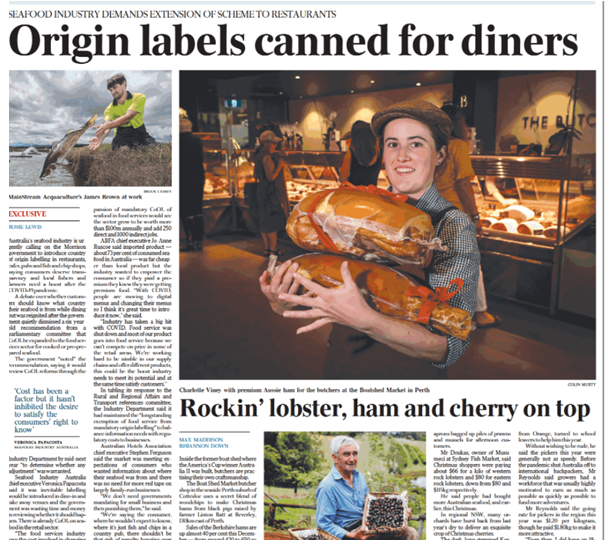Seafood industry demands extension of scheme to restaurants: origin labels canned for diners
December 21, 2020

Australia’s seafood industry is urgently calling on the Morrison government to introduce country of origin labelling in restaurants, cafes, pubs and fish and chips shops, saying consumers deserve transparency and local fishers and farmers need a boost after the COVID-19 pandemic.
A debate over whether customers should know what country their seafood is from while dining out was reignited after the government quietly dismissed a six year old recommendation from a parliamentary committee that could be expanded to the food services sector for cooked or pre-prepared seafood.
The government ‘noted’ the recommendation, saying it would review CoOL reforms through the Industry Department by mid next year “to determine whether any adjustment” was warranted.
Seafood Industry Australia chief executive Veronica Papacosta said it was inevitable labelling could be introduced in dine-in and takeaway venues and the government was wasting time and money in reviewing whether it should happen. There was already CoOL on seafood in the retail sector.
“The food service industry says the cost involved in changing the menu, whether it’s the first one-off cost or ongoing cost, is too onerous. If you talk to the retail sector, which has had two iterations of changes, cost has been a factor but it hasn’t inhibited the desire to satisfy the consumers’ right to know,” she said. “Government and food service representatives have repeatedly told us consumers can ask a waitress. We did our own study which found 66 per cent of waiters didn’t know, they couldn’t accurately answer the question.”
The Australian Barramundi Farmers Association found an expansion of mandatory CoOL of seafood in food services would see the sector grow to be worth more than $100m annually and add 250 direct and 1000 indirect jobs.
ABFA chief executive Jo Anne Ruscoe said imported product – about 73 per cent of consumed sea food in Australia – was far cheaper than local product but the industry wanted to empower the consumer so if they paid a premium they know they were getting premium food. “With COVID, people are moving to digital menus and changing their menus so I think it’s great time to introduce it now,” she said.
“Industry has taken a big hit with COVID. Food service was shut down and most of our product goes into food service because can’t compete on price in some of the retail stores. We’re working hard to be nimble in our supply chains and offer different products, this could be the boost industry needs to meet its potential and at the same time satisfy customers.”
In tabling its response to the Rural and Regional Affairs and Transport references committee, the Industry Department said it had maintained the “longstanding exemption of food service from mandatory origin labelling” to balance information needs with regulatory costs to businesses.
Australian Hotels Association chief executive Stephen Ferguson said the market was meeting expectations of consumers who wanted information about where their seafood was from and there was no need for more red tape on largely family-run businesses.
“We don’t need governments mandating for small business and then punishing them” he said.
“We’re saying the consumer, where he wouldn’t expect to know, where it’s just fish and chips in a country pub, there shouldn’t be that risk of penalty hanging over people just to meet that red tape.”
Marty Phillips, who heads barramundi farm Mainstream Aquaculture’s business operations in Queensland, said an expansion of CoOL into food services would mean more income, more jobs and a growing company. “it’s not doing our industry any good by the imported stuff getting the same label and image,” he said.
Industry Minister Karen Andrews’ spokeswoman said the evaluation of CoOL reforms was particularly timely as COVID-19 has seen a groundswell in support for Australian-made food.
Source: https://www.theaustralian.com.au, viewed 21 December 2020.